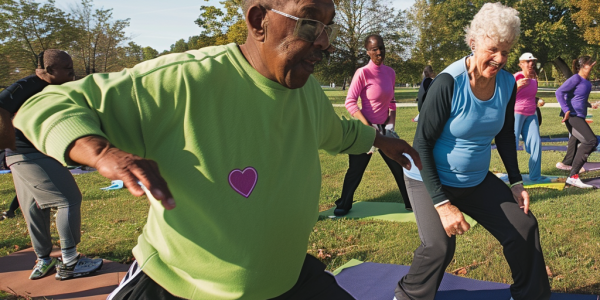Local Woman’s Battle with Sepsis Highlights Urgent Need for Awareness
As September marks National Sepsis Awareness Month, Jackie Duda’s near-fatal experience with septic shock highlights the critical need for awareness and timely medical intervention. Sepsis affects over a million Americans annually, and recognizing its symptoms can save lives. Duda’s journey from a perforated colon to recovery underscores the importance of vigilance in the face of this ‘sneaky’ condition. Join the fight against sepsis by learning about its signs and advocating for health awareness.
Rucking: The Accessible Fitness Trend Transforming Workouts
Discover the rising trend of rucking, a simple yet effective fitness method that combines walking with a weighted backpack. Ideal for all fitness levels, rucking enhances strength and endurance while fitting seamlessly into busy schedules. Learn how to get started, the health benefits, and the community aspect of this accessible workout.
Island Health Urges Vaccinations Amid Rising Whooping Cough Cases on Vancouver Island
As whooping cough cases surge on Vancouver Island, health officials are urging vaccinations to protect the community. With 17 recent diagnoses, Island Health emphasizes the importance of immunization for infants, children, and adults to prevent this highly contagious respiratory infection. Learn more about vaccination schedules and stay informed to safeguard your health.
Jacob Meyer Joins UW–Madison as New Kinesiology Professor
The University of Wisconsin–Madison welcomes Jacob Meyer as an Assistant Professor in Kinesiology, specializing in exercise psychology. With a strong academic background and a focus on behavioral interventions for mental health, Meyer aims to enhance understanding of exercise’s impact on mood and well-being. His return to UW–Madison marks a significant addition to the faculty, promising innovative research and community engagement.
HiDEF-seq: A Revolutionary Advancement in DNA Sequencing
Discover the groundbreaking HiDEF-seq technique developed by NYU Langone Health, which offers unprecedented precision in detecting early DNA mutations. This innovative DNA sequencing method enhances our understanding of genetic disorders and could revolutionize disease prevention and treatment, particularly in cancer research.
Uncovering STING Protein’s Role in Cellular Aging and Health
Recent research from the University of Pittsburgh reveals the pivotal role of the STING protein in cellular aging and stress management. This groundbreaking study highlights STING’s dual functions in inflammation and cellular protection, suggesting new therapeutic strategies for age-related diseases. Discover how STING activation enhances lysosome production and autophagy, promoting cellular health and longevity.
Breakthrough in Regenerative Medicine: New Cell Therapy Enhances Tissue Healing
Recent research from Monash University reveals groundbreaking advancements in regenerative medicine through a new cell-based therapy utilizing Regulatory T cells. This innovative approach significantly enhances tissue healing, potentially revolutionizing treatments for injuries and conditions such as heart attacks and brittle bone disease. Published in Nature Communications, the study emphasizes the importance of timely intervention and the possibility of off-the-shelf cell therapies, paving the way for more efficient and accessible medical solutions.
Iowa Officials Urge Lifestyle Changes to Combat Heart Disease Crisis
As heart disease remains the leading cause of death in Iowa, health officials stress the importance of lifestyle changes to combat this growing issue. With over 7,000 lives lost annually, experts like McKenna Schmidt encourage Iowans to adopt healthier habits, cease smoking, and engage in regular exercise. Despite access to healthcare, many neglect annual check-ups, risking a future where over 60% of adults may face heart disease by 2050. Prioritizing heart health is essential for Iowans to ensure a healthier future.
Exploring the Science Behind ‘Man Flu’: Gender Differences in Illness Responses
The term ‘man flu’ humorously describes men’s exaggerated reactions to minor illnesses, raising questions about the biological and behavioral differences in how genders experience sickness. Research indicates that men may have weaker immune responses and are less likely to seek medical care, contributing to the perception of suffering more intensely. Understanding these disparities can foster empathy and challenge stereotypes associated with male illness.
New SARS-CoV-2 Mutation Enhances Virus’s Ability to Infect the Brain
Recent research published in Nature Microbiology reveals significant mutations in the SARS-CoV-2 virus that enhance its ability to infect the central nervous system, shedding light on neurological symptoms and long COVID. Conducted by researchers from Northwestern University and the University of Illinois-Chicago, the study identifies crucial changes in the spike protein that facilitate brain infection, paving the way for targeted treatments to mitigate the neurological impacts of COVID-19.










